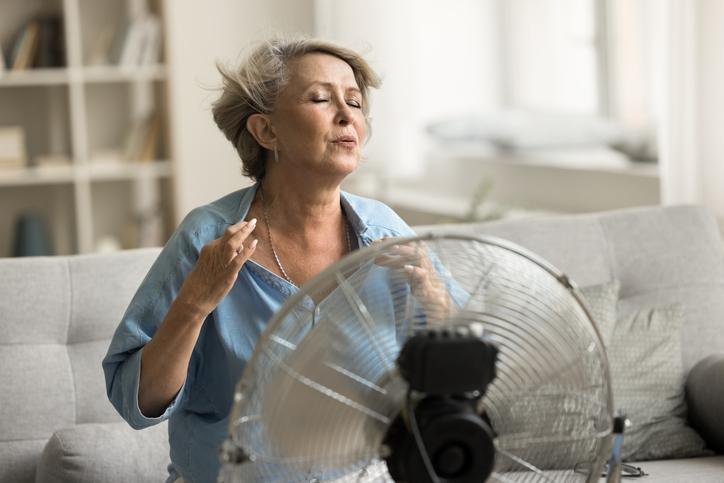
Trying to lose weight? Be careful not to lose muscle

Is your skin problem actually an autoimmune condition?

People with diabetes face higher risk of hearing loss

Antibiotic-free fixes for recurrent UTIs

Musculoskeletal syndrome of menopause: When menopause makes you ache all over

When can older women stop getting mammograms?

To lose weight, especially harmful belly fat, combine diet and exercise

Can men hold off on treating recurring prostate cancer?

The 7 types of rest and why we need them all

What are the early warning signs of cervical cancer?
Harvard Health Blog
Read posts from experts at Harvard Health Publishing covering a variety of health topics and perspectives on medical news.
Articles
Can men hold off on treating recurring prostate cancer?
What happens if PSA levels start rising after surgery or radiation for prostate cancer? Sometimes men live the rest of their lives with a rising PSA without ever developing metastases. Now, an ultra-sensitive scanning technology is raising new questions about biochemical recurrence and how to manage it.
How does prostate cancer treatment affect mental health?
The long-term outlook for men diagnosed with prostate cancer continues to improve. These medical advances, however, have also drawn attention to the mental health challenges many survivors encounter. It’s still common for survivors to struggle with loss of masculine self-esteem and changes in body image.
5 timeless habits for better health
Influencers, news headlines, and well-meaning friends and family offer conflicting advice on wellness. Quick fixes and fads may do little for our health, and some even prove harmful. Try to work these five simple habits that can boost health and wellness into your everyday life.
What are the symptoms of prostate cancer?
A PSA test can detect early-stage prostate cancer while it’s still asymptomatic, but some men are diagnosed with prostate cancer only after symptoms appear. The editor in chief of the Harvard Medical School Guide to Prostate Diseases answers questions about how doctors distinguish prostate cancer from other noncancerous problems affecting the prostate.
Is your breakfast cereal healthy?
In the US, more than a quarter of children and adolescents have ready-to-eat cereal for breakfast most days of the week. Advertising touts cereal as a healthy choice, but a recent study disputes this.
How is PSA used to monitor prostate cancer?
Men on active surveillance for low-risk prostate cancer might need treatment if their PSA levels start to rise. Doctors also measure PSA to check for recurring cancer in men who were already treated with surgery or radiation. But use of the test in such cases differs in important ways.
Extreme heat endangers older adults: What to know and do
The surge in heat waves and extreme heat poses serious health risks for everyone but is a particular worry for older adults. What can you do to manage heat-related risks, especially if you have existing health conditions or take certain medications?
Want to cool down? 14 ideas to try
Climate change has made summers hotter, and the struggle to stay cool has led to more cases of heat-related illness. Don't wait until you're overheated to figure out how to cool down; use these ideas to get you started.
What is a PSA test and how is it used?
Every year, millions of men around the world get a prostate-specific antigen (PSA) test. Abnormal readings on the test suggest a man might have prostate cancer. But how should an abnormal result be interpreted?
Gratitude enhances health, brings happiness — and may even lengthen lives
Gratitude has the power to boost well-being, improve sleep, lessen depression, and help heart health. Now new data from the long-term Nurses' Health Study shows that it may extend lives. How can you jump start a gratitude practice in your life?
Respiratory health harms often follow flooding: Taking these steps can help
Flooding due to major storms or heavy rains can harm lung health, both from toxic contaminants that end up in the air and from the growth of mold caused by dampness. Taking steps to prevent flooding when possible and moving quickly to reduce health risks if flooding occurs can help protect your family's health.
Swimming lessons save lives: What parents should know
Every year, more than 4,500 people die from drowning in the United States. Swimming lessons help save lives and parents should know how to choose the right program and encourage children to learn skills that will help them to stay safe at the beach and around ponds or pools.
Wildfires: How to cope when smoke affects air quality and health
Wildfire smoke contributes greatly to poor air quality, and as wildfires become more frequent due to climate change and drier conditions, more of us and more of our communities are at risk for health harms. Here are ways to cope.
What can magnesium do for you and how much do you need?
Magnesium is a mineral the human body needs to function properly — especially for a healthy cardiovascular system, nerves, muscles, and bones — though the benefits of supplements are largely oversold. While most people get enough magnesium from their diet, in certain instances people should take a supplement.
How is metastatic prostate cancer detected and treated in men over 70?
The US Preventive Services Task Force recommends against screening for prostate cancer in men older than 70, but as life expectancy for this group increases and treatment options evolve, it's important for men to be aware of their options.
Salmonella is sneaky: Watch out
If you've ever had food poisoning caused by Salmonella bacteria, you know it's unpleasant but typically goes away within two to three days. You may not know that these bacteria sicken more than a million people in the US each year — and can be deadly for some. You can take steps to avoid getting sick.
Two jobs may lower the odds of dying from Alzheimer's disease — but why?
Researchers have found that the risk of death due to Alzheimer's disease is markedly lower in taxi and ambulance drivers compared with hundreds of other occupations. And the reason could be that these drivers develop certain structural changes in their brains as they work.
How — and why — to fit more fiber and fermented food into your meals
A healthy diet is key to a healthy gut microbiome, which helps the immune system function well and reduces chronic inflammation among other important tasks. And increasing evidence suggests that fiber and fermented foods can play important roles in gut health.
Can a routine vaccine prevent dementia?
It's fairly common for a medical treatment to cause side effects — but far more rarely, a side effect provides an unexpected benefit. This might be the case for the shingles vaccine, as evidence is mounting that it might also reduce the risk of dementia.
Less butter, more plant oils, longer life?
Long-term research found that higher consumption of butter increases mortality risk, while higher consumption of plant-based oil lowers it. And substituting certain plant oils for butter might help people live longer. What's a butter lover to do?
Healthier planet, healthier people
Our health is intertwined with the health of planet Earth, and the impacts of climate change threaten our well-being. Collectively taking small steps like eating more plant-forward meals, using bikes or public transit, and even sharing our pledges can help move the needle in a positive direction.
Counting steps is good — is combining steps and heart rate better?
Monitoring daily step count can encourage people to be more active. When it comes to assessing fitness or risk for major illnesses, though, is a new measurement that combines both average steps and heart rate better?
Can saw palmetto treat an enlarged prostate?
Marketed as a natural remedy for an enlarged prostate, saw palmetto is a top-selling dietary supplement. By one estimate, more than a third of all US adults who take supplements use saw palmetto. But experts at Harvard say men should view its supposed benefits for prostate health skeptically.
Respiratory health harms often follow flooding: Taking these steps can help
Flooding due to major storms or heavy rains can harm lung health, both from toxic contaminants that end up in the air and from the growth of mold caused by dampness. Taking steps to prevent flooding when possible and moving quickly to reduce health risks if flooding occurs can help protect your family's health.

Trying to lose weight? Be careful not to lose muscle

Is your skin problem actually an autoimmune condition?

People with diabetes face higher risk of hearing loss

Antibiotic-free fixes for recurrent UTIs

Musculoskeletal syndrome of menopause: When menopause makes you ache all over

When can older women stop getting mammograms?

To lose weight, especially harmful belly fat, combine diet and exercise

Can men hold off on treating recurring prostate cancer?

The 7 types of rest and why we need them all

What are the early warning signs of cervical cancer?
Free Healthbeat Signup
Get the latest in health news delivered to your inbox!
Sign Up
























